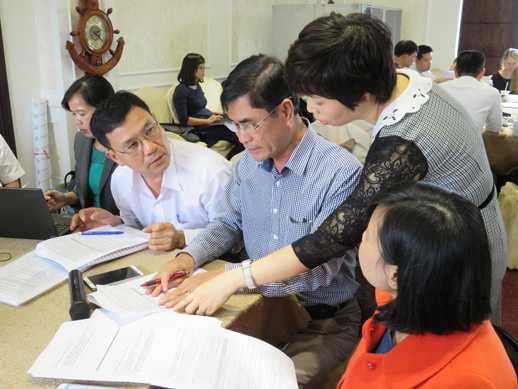Vietnam: Empowering Communities to Detect Potential Outbreaks Early
A parent hears rumors from other parents about several children bitten by a rabid dog. A teacher sees an unusually high number of children absent from school and hears that they all have similar symptoms. It could be a coincidence. It could be a local disease outbreak. Or it could be the first signs of an epidemic.
Vietnam is bordered by China, Laos, and Cambodia, and is a popular tourist destination, receiving over seven million tourists annually. As with all countries, Vietnam is vulnerable to importation of infectious diseases that may spread throughout the country. One way to decrease this vulnerability is to make sure people in the community know how to recognize and report unusual disease events. That’s where Vietnam’s event-based surveillance pilot project comes in.
What is event-based surveillance?
There are two main kinds of disease surveillance, event-based surveillance (EBS) and indicator-based surveillance. Both types of surveillance include collecting, monitoring, assessing, and interpreting data. However, the types of data used are different. Indicator-based surveillance uses reports of specific diseases. These usually come from hospitals or epidemiology studies. EBS uses media or rumors, including social media such as blogs. EBS has advantages that include:
• Speed: EBS can detect unusual events faster than indicator-based surveillance.
• Geography: EBS can be used anywhere, whereas indicator-based surveillance is most effective in places with a public health infrastructure.
Promoting community participation
Teachers and village health workers aren’t doctors, but they can be taught how to recognize cases or clusters of potential cases of priority diseases like hand, foot, and mouth disease, a viral illness that usually affects infants and children under five. While most children recover, a small number of people develop severe complications that require hospitalization or even cause death. That is why it’s important to catch it and other diseases early.
In Vietnam, community members will be taught to report suspected outbreaks to local public health officials through a telephone hotline. After receiving a community report, public health professionals investigate to determine if the reported event appears to be an actual disease outbreak. Laboratory tests may be conducted to identify or confirm the disease. At that point, the ministry of health can make an informed decision about how to respond.
Working together
This project is a partnership between CDC, PATH, and the Government of Vietnam. It will train people at every administrative level (national, provincial, district and commune) to identify potential outbreaks, standardize reporting mechanisms, and shorten response times. Community members from different sectors will be involved, including teachers, pharmacists, laboratorians, reporters, and many more.
The results of this project will inform the development of national guidelines for EBS, which will then be integrated into routine disease surveillance activities at all levels. EBS will serve as a community-based source of information that feeds into Vietnam’s network of emergency operations centers, significantly enhancing Vietnam’s capacity for early warning and response of potential disease outbreaks.
About This Story
This story illustrates Vietnam’s commitment to implementing the Global Health Security Agenda (GHSA), which aims to improve the world’s ability to prevent, detect, and respond to infectious disease threats.
Vietnam’s investments in event-based surveillance will help them meet the GHSA Real-Time Surveillance target, which aims to strengthen the surveillance systems that detect events of significance for public health, animal health and health security. CDC is partnering with 31 countries around the world, including Vietnam, to reach the goals of the GHSA.
Related Links
- Page last reviewed: May 3, 2016
- Page last updated: May 3, 2016
- Content source:
Global Health
Notice: Linking to a non-federal site does not constitute an endorsement by HHS, CDC or any of its employees of the sponsors or the information and products presented on the site.


 ShareCompartir
ShareCompartir
